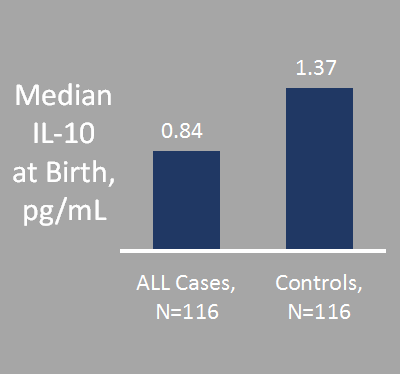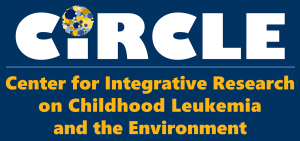

Project 1: In Utero Chemical Exposures, Immune Status, and Childhood Leukemia
The Immune Development Project (Project 1) is led by Dr. Catherine Metayer and Dr. Xiaomei Ma, two of the world’s preeminent experts in the search for causes of childhood leukemia. Dr. Metayer and Dr. Ma have dedicated years to leukemia research and their study cohorts – the California Childhood Leukemia Study and the California Mother-Child Birth Cohort – provide the infrastructure that supports CIRCLE with biospecimens and data from birth certificates and participant interviews.
We incline on our evidence to the belief that the solution of the problem of leukaemia lies rather in some peculiar reaction to infection than in the existence of some specific infective agent.
-J Poynton, H Thursfield and D Paterson, Great Ormond Street Hospital for Sick Children, London, 1922.
The Immune System and Childhood Leukemia
Leukemia is a malignancy of immune cells (called “leukocytes”), in the blood. As such, abnormal immune-system development plays an important role in the initiation of childhood leukemia. Several studies have indicated that early-life infections have the potential to influence the development of the immune system and, by extension, the risk of childhood leukemia. One leading theory – referred to as the “delayed infection hypothesis” – suggests that when a child is NOT exposed to common infections early in life, her uneducated immune system will be more likely to react poorly to infections later in life, potentially leading to the development of leukemia. Epidemiological studies using indirect measures of early-life immune challenges – such as being born via vaginal delivery, living with older siblings, having social contacts in daycare settings, or being vaccinated – have consistently reported a subsequent reduction in childhood leukemia risk, supporting the role of early-life immune-system education in protecting children from leukemia-causing infections.
The two most common molecular subtypes of childhood leukemia are initiated in utero and studies of biomarkers in newborns suggest that abnormal immune-system development before birth may also play a role in the initiation of childhood leukemia.
How CIRCLE Measures Immune Development
To assess immune status at birth, CIRCLE measures a panel of nine cytokines — interleukins IL1β, IL4, IL6, IL8, IL10, IL12p70, granulocyte-macrophage colony-stimulating factor (GM-CSF), tumor necrosis factor alpha (TNFα), and vascular endothelial growth factor (VEGF) — in blood samples collected from newborn babies. CIRCLE investigators have reported that infants who went on to develop childhood leukemia were born with profoundly depressed levels of IL10, a critical immunosuppressive cytokine that regulates immune responses to infection after birth in healthy individuals. Finding these abnormal IL-10 levels in the blood of newborns who went on to develop childhood leukemia provides more evidence of the role of immune development in the etiology of childhood leukemia.
More recent CIRCLE research has implicated a wider array of cytokines (in addition to IL-10) as potential biomarkers of immune dysregulation in archived neonatal biospecimens collected from childhood leukemia patients. At the same time, CIRCLE investigators are using a mouse model to reveal connections between in utero chemical exposures and disruptions in cytokine levels at birth. These controlled experiments are providing important insight into the relationships between environmental exposures, neonatal cytokine levels, and childhood leukemia risk.


A profound deficiency of IL-10 at birth in children who develop ALL later in life. More details available from Chang et al. (2011). Cancer Epidemiol Biomarkers Prev. 20(8):1736-40. doi: 10.1158/1055-9965.EPI-11-0162.
What are cytokines?
A cytokine is a small protein which is released by cells. Once released, cytokines influence the behavior of other cells through receptors, a process which can be thought of as an intercellular interaction or as intercellular communication. The cytokines include interleukins, lymphokines and cell signal molecules, such as tumor necrosis factor and the interferons. An important group of cytokines are those which modulate the balance between humoral and cell-based immune responses through the regulation of the maturation, growth, and responsiveness of particular immune cell populations. It is this group of cytokines — the ones which trigger inflammation and respond to infections — that are the focus of CIRCLE’s Immune Development Project.

